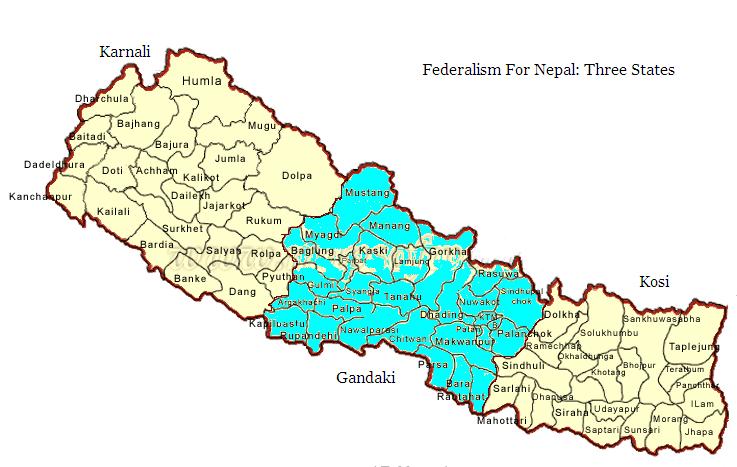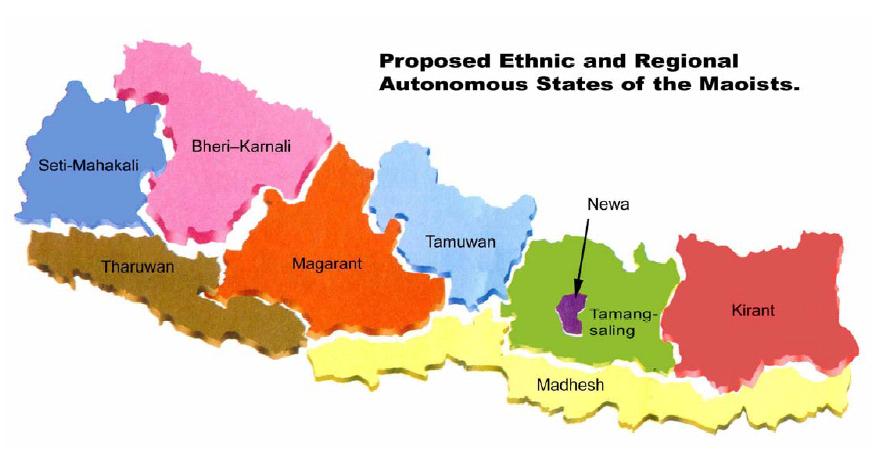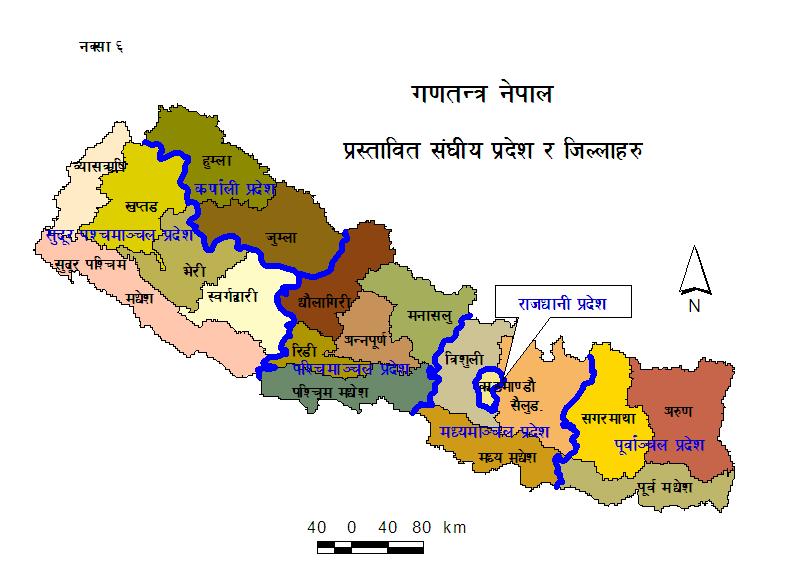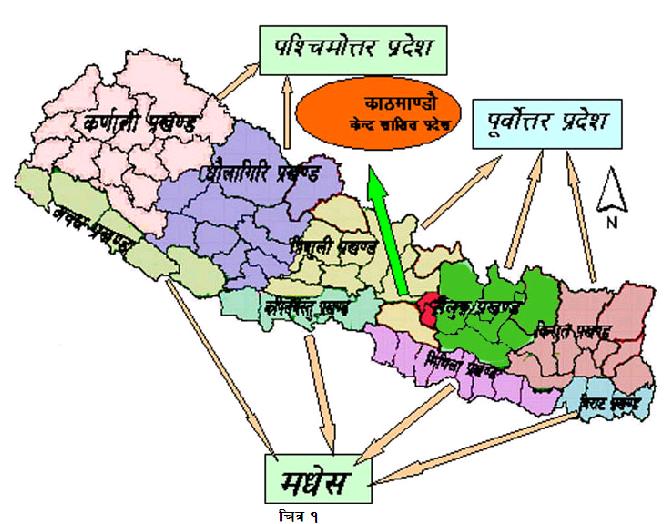
Proposed Constitution
Interim Constitution Draft
माओवादीको संविधान मस्यौदा
नेपालमा अठारौं शताब्दीको उत्तरार्द्धदेखि कायम रहँदै आएको निरंकुश राजतन्त्रात्मक केन्द्रीय सामन्ती राज्यसत्ताविरुद्ध जनताले सन् १९५० आसपासदेखि सञ्चालन गर्दैआएको सशस्त्र तथा निःशस्त्र लोकतान्त्रिक आन्दोलन र मुख्यतः सन् १९९६ देखि नेकपा -माओवादी) को नेतृत्वमा सञ्चालित जनयुद्धको जग तथा माओवादी-सात पार्टी १२ बुँदे समझदारीको आडमा अपि्रल २००७ मा गणतन्त्रात्मक राज्यव्यवस्था संस्थागत गर्ने ऐतिहासिक जनआन्दोलनको जनादेशअनुरूप सामन्ती राजतन्त्रात्मक राज्यसत्ता अन्त्य गरी पूर्ण लोकतान्त्रिक गणतन्त्रात्मक राज्यव्यवस्था संस्थागत गर्ने ऐतिहासिक आवश्यकता मध्यनजर गर्दै देशको सार्वभौमिकता, स्वाधीनता र भौगोलिक अखण्डताको संरक्षण र सम्बर्द्धनमा पूर्ण प्रतिबद्ध रहँदै, राज्यको सम्पूर्ण शक्तिको स्रोत नेपाली जनतामात्र हुन् भन्ने मान्यतालाई दह्रोसँग आत्मसात् गर्दै, देशका बहुसंख्यक शोषित, उत्पीडित वर्ग, जाति, क्षेत्र, लिंग र समुदायका समस्यालाई दीर्घकालीन ढंगले सम्बोधन गर्ने गरी राज्य र समाजको अग्रगामी पुनर्संरचना गर्नुपर्ने आवश्यकतालाई बोध गर्दै, पहाड, उपत्यका र मधेसका विविध उत्पीडित जाति र क्षेत्रहरूको आत्मनिर्णयको अधिकार र स्वायत्त शासनको नीतिका आधारमा राज्यको पुरानो एकात्मक ढाँचाको अन्त्य गरी नेपाली विशेषता अनुरूपको संघात्मक राज्य प्रणाली कायम गर्नुपर्ने तथ्य ध्यानमा राख्दै, सबै वर्ग, जाति, क्षेत्र, लिंग र समुदायको समानुपातिक र समावेशी प्रतिनिधित्व हुने गरी निर्वाचित संंविधानसभामार्फत अर्काे लोकतान्त्रिक संविधान निर्माण नभएसम्म लोकतान्त्रिक आन्दोलनकारी शक्तिहरूको बृहत् राष्ट्रिय राजनीतिक सम्मेलनमार्फत हामी सार्वभौमसत्ता सम्पन्न नेपाली जनता स्वयंले विगतमा कायम रहँदै आएको नेपाल अधिराज्यको संविधान, २०४७ खारेज गरी यो संघीय लोकतान्त्रिक गणतन्त्र नेपालको अन्तरिम संविधान, २०६३ जारी गरी लागू गरेका छौं ।
भाग १
राज्यका निर्देशक सिद्धान्त
-१) राजतन्त्र र सामन्ती निरंकुशताका सबै अवशेष पूर्णरूपले अन्त्य गरी लोकतान्त्रिक गणतन्त्रात्मक राज्यव्यवस्था कायम गरिनेछ ।
-२) बहुदलीय प्रतिस्पर्धात्मक शासन प्रणाली, वालिग मताधिकार, आवधिक निर्वाचन, विधिको शासन, मानवअधिकार, मौलिक हक आदि सर्वस्वीकृत लोकतान्त्रिक मूल्य र मान्यताप्रति पूर्ण प्रतिबद्धता रहनेछ ।
-३) सामन्तवादी र साम्राज्यवादी शोषण-उत्पीडनका सबै रूप अन्त्य गरी राजनीतिक, आर्थिक, सामाजिक, सांस्कृतिक सबै क्षेत्रमा लोकतान्त्रिक मूल्य मान्यता स्थापित गरिनेछ ।
-४) आर्य-खस उच्च जातीय अहंकारवादमा आधारित सामन्ती एकात्मक राज्य प्रणालीको अन्त्य गरी उत्पीडित जाति र क्षेत्रको आत्मनिर्णय अधिकार र स्वायत्त शासनमा आधारित नेपाली विशेषता अनुरूपको संघात्मक राज्यप्रणाली कायम गरिनेछ ।
-५) राज्य पूर्णरूपले धर्मनिरपेक्ष हुनेछ ।
-६) कृषि क्षेत्रमा सबैखाले सामन्ती भूमिसम्बन्धको अन्त्य गरिनेछ र 'जमिन जोत्नेको' सिद्धान्तका आधारमा प्रगतिशील भूमिसुधार कार्यान्वयन गरिनेछ ।
-७) मजदुर, गरिब किसान, सुकुम्बासी, कमैया, हरुवा, चरुवा आदिको हितमा राज्यले विशेष व्यवस्था गर्नेछ ।
-८) तीव्र तथा व्यापक राष्ट्रिय औद्योगिकीकरणको नीति अवलम्बन गरिनेछ र राष्ट्रिय उद्यमी, व्यापारीको संरक्षण निम्ति उपयुक्त वित्तीय नीति-नियम तर्जुमा र कार्यान्वयन गरिनेछ ।
-९) पञ्चशीलका आधारमा सबै मुलुकसँग दौत्य सम्बन्ध कायम गरिनेछ र दुई प्रमुख छिमेकी भारत र चीनसँगको सम्बन्ध सन्तुलित र सुमधुर राख्न विशेष प्रयत्न गरिनेछ ।
-१०) सबै असमान सन्धि-सम्झौता खारेज गरिनेछन् र समानता तथा परस्पर हितका आधारमा नयाँ सन्धि-सम्झौता गरिनेछन् ।
-११) राज्यले दसवर्षे जनयुद्ध र जनआन्दोलन क्रममा सहिद हुनेको समुचित सम्मानका निम्ति आवश्यक व्यवस्था गर्नेछ । बेपत्ता हुनेको खोज अनुसन्धान गरी त्यसका अपराधीलाई उचित दण्ड दिनेछ । सहिद परिवार, बेपत्ता हुनेको परिवार र घाइते तथा अंगभंग हुनेको सुरक्षा र सहुलियतका निम्ति राज्यले विशेष व्यवस्था गर्नेछ ।
-१२) वृद्धवृद्धा, अनाथ, अपांग र दीर्घ रोगीको संरक्षण राज्यले गर्नेछ ।
भाग २
नागरिकता
-१) प्रत्येकको नागरिकता प्राप्त गर्ने हक हुनेछ र कसैलाई पनि बिनाकुनै उचित कारण वञ्चित गरिने छैन ।
-२) बाबु वा आमामध्ये कुनै एकका नाताले सन्तानले नागरिकता प्राप्त गर्न सक्नेछ ।
-३) लामो समयदेखि नेपालमा बसोबास गर्दैआएका तर नागरिकताबाट वञ्चित विशेषतः मधेसका सबै जनतालाई संविधानसभा निर्वाचन अगावै उच्चस्तरीय नागरिकता आयोग गठन गरी स्थानीयरूपमा सर्वदलीय समितिको सिफारिसमा तत्कालै नागरिकता वितरण गरिनेछ ।
-४) नागरिकता प्राप्ति र समाप्तिलगायतका अन्य विषय कानुनद्वारा निर्धारित भएबमोजिम हुनेछन् ।
भाग ३
मौलिक हक र कर्तव्य
१. मौलिक हक
नागरिक कानुनको दृष्टिमा समान हुनेछन् । जाति, वर्ग, लिंग, भाषा, संस्कृति र विचार तथा आस्थाका आधारमा कसैमाथि कुनै भेदभाव गरिने छैन । नागरिक विचार अभिव्यक्त गर्न, प्रकाशन गर्न, संघसंस्था खोल्न, चुन्न र चुनिन, आवातजावात गर्न, भेला वा जम्मा हुन, कुनै पनि पेसा गर्न स्वतन्त्र हुनेछन् । कानुनबमोजिमबाहेक कसैको वैयक्तिक स्वतन्त्रता अपहरण हुनेछैन । शिक्षा, स्वास्थ्य, आवास र रोजगारी हरेक नागरिकको जन्मसिद्ध अधिकार हुनेछ । नागरिकलाई छुवाछूत, सामाजिक भेदभाव र शोषणविरुद्धको हक हुनेछ । महिलामाथि पितृसत्तात्मक शोषणका सबै रूप अन्त्य हुनेछ । छोरीलाई छोरासरह पैतृक सम्पत्तिमाथि समान हक हुनेछ । विवाह, सम्पत्ति बेचबिखन, सम्बन्ध-विच्छेद वा गर्भधारण वा गर्भपतन सम्बन्धमा महिलालाई पूर्ण स्वतन्त्रता हुनेछ । राज्यसत्ताका अंगमा प्रतिनिधित्वलगायत सबै क्षेत्रमा महिला निम्ति विशेष अधिकार ग्यारेन्टी गरिनेछ । दलित छुवाछूतलगायत सबैखाले मनुवादी शोषण-उत्पीडनका रूप अन्त्य हुनेछ र सबै क्षेत्रमा दलितलाई विशेष अधिकार सुनिश्चित गरिनेछ । भूमिमाथि वास्तविक जोताहा र किसानको अधिकार हुनेछ । कुनै पनि प्रकारको विभेद र उत्पीडनविरुद्ध माग राख्ने, सामूहिक सौदाबाजी गर्ने, हडताल गर्ने हक श्रमिक र मजदुर वर्गलाई रहनेछ । मातृभाषामा शिक्षा, सरकारी कामकाज गर्ने अधिकार हुनेछ । प्रत्येक नागरिकलाई आपmनो सम्पत्ति भोगचलन गर्न पाउने हक हुनेछ । कसैले पनि कानुनद्वारा तोकिएभन्दा बढी सम्पत्ति राख्ने पाउनेछैन । प्रत्येक नागरिक आस्थाअनुसार धर्म मान्न वा नमान्न स्वतन्त्र रहनेछन् । स्थानीय जल, जमिन, जंगल, खानीलगायतका प्राकृतिक स्रोत साधनमा स्थानीय जनताकै प्राथमिक हक रहनेछ । नागरिकलाई हक प्रचलनका लागि सक्षम अदालतबाट प्रभावकारी उपचार प्राप्त गर्ने हक हुनेछ ।
२. कर्तव्य
नागरिकले संविधान र कानुनको पालना गर्नुपर्नेछ । राज्यको सम्पत्ति रक्षा गर्नुपर्नेछ । सेनामा भर्ती हुने र देशको रक्षा निम्ति राज्यले आह्वान गरेबमोजिम काम गर्नुपर्नेछ ।
भाग ४
अन्तरिम व्यवस्थापिका
-१) एक सर्वशक्ति सम्पन्न अन्तरिम व्यवस्थापिका रहनेछ । देशको व्यवस्थापकीय अधिकार यसै संविधान र यस संविधानमुताबिक बनेको कानुनबमोजिम प्रयोग हुने गरी यसै अन्तरिम व्यवस्थापिकामा निहित हुनेछ ।
-२) यसको गठन अन्तरिम अवधिमै एक बृहत् राष्ट्रिय राजनीतिक सम्मेलनले गर्नेछ । त्यस सम्मेलनको सहभागिता र त्यसको आधार नेकपा -माओवादी) र सात राजनीतिक दलबीचको वार्ताद्वारा टुंगो लगाइनेछ ।
-३) बृहत् राष्ट्रिय राजनीतिक सम्मेलनले देहायबमोजिम अन्तरिम व्यवस्थापिका गठन गर्नेछ ः
-क) सात दलबाट एक तिहाइको संख्यामा जम्मा १०१ प्रतिनिधि -ख) माओवादीका तर्फबाट एक तिहाइको संख्यामा जम्मा १०१ प्रतिनिधि -ग) लोकतान्त्रिक आन्दोलनमा सहभागी नागरिक समाज, जनवर्गका संगठन र देशका विशिष्ट व्यक्तित्वमध्येबाट एकतिहाई संख्यामा जम्मा १०१ प्रतिनिधि । तिनीहरूको छनोट सात दल र माओवादीको आपसी सहमतिमा निश्चित गरेबमोजिम हुनेछ । यसरी प्रतिनिधिहरूको छनोट गर्दा वर्गीय, जातीय, क्षेत्रीय, लिंगीय र अन्य समुदायको समुचित समावेशीकरणमा ध्यान दिनुपर्नेछ । यस हिसाबले अन्तरिम विधायिकाको कुल सदस्य संख्या ३०३ हुनेछ ।
-४) पुनःस्थापित प्रतिनिधिसभा यो संविधान जारी भएकै दिन भंग हुनेछ र उक्त प्रतिनिधिसभाले प्रयोग गरिआएको सम्पूर्ण अधिकार यसै संविधानबमोजिम हुने गरी यो अन्तरिम व्यवस्थापिकाले प्रयोग गर्नेछ ।
-५) अन्तरिम कालमा राज्यको सर्वाेच्च अंग यही अन्तरिम व्यवस्थापिका हुनेछ । यसले मन्त्रिपरिषद्को गठन, संवैधानिक पदहरूमा निर्वाचन, कानुन निर्माण, संशोधन र खारेजी, परराष्ट्र सम्बन्ध र सन्धि-सम्झौता अनुमोदन, युद्ध र शान्तिको घोषणा, बजेट पारित, संविधानसभाको निर्वाचनसम्बन्धी काम आदिबारे आवश्यक कार्य गर्नेछ ।
-६) अन्तरिम व्यवस्थापिकाले पहिलो बैठकमा एक अध्यक्ष र एक उपाध्यक्षको निर्वाचन गर्नेछ ।
-७) अन्तरिम व्यवस्थापिकाले सामान्य निर्णयहरू बहुमतबाट गर्नेछ भने दूरगामी असर पार्ने राष्ट्रिय हितका विषय दुई तिहाइ बहुमत वा जनमत संग्रहबाट निर्णय हुनेछन् । यसको प्रक्रिया तोकिएबमोजिम हुनेछ ।
-८) अन्तरिम व्यवस्थापिकाको कार्यकाल निर्वाचित संविधानसभा गठन भएसम्मका लागि हुनेछ ।
-९) अन्तरिम व्यवस्थापिकाको पदावधि बाँकी हुँदै कुनै पद रिक्त भए बाँकी अवधिका लागि पदपूर्ति हुनेछ । यसरी पदपूर्ति गर्दा जुन आधारमा प्रतिनिधित्व गरेको हो सोही आधारमा पदपूर्ति हुनुपर्नेछ ।
भाग ५
अन्तरिम सरकार
-१) अन्तरिम व्यवस्थापिकाले प्रधानमन्त्रीको नेतृत्वमा अन्तरिम सरकारको काम गर्ने एक मन्त्रिमण्डल गठन गर्नेछ । कार्यकारिणी अधिकार अन्तरिम सरकार वा मन्त्रिमण्डलमा निहित हुनेछ । दैनिक प्रशासन सञ्चालन गर्ने सबै प्रकारका कार्यकारिणी अधिकारको प्रयोग मन्त्रिपरिषद्ले गर्नेछ । मन्त्रिपरिषद् सम्पूर्णरूपमा अन्तरिम व्यवस्थापिकाप्रति उत्तरदायी हुनेछ ।
-२) अन्तरिम सरकारका प्रधानमन्त्रीले अन्तरिम व्यवस्थापिकामा प्रतिनिधित्वबमोजिम प्रतिनिधित्व हुने गरी मन्त्रिमण्डल गठन गरी कार्य विभाजन गर्नेछन् । मन्त्रिपरिषद् सदस्य संख्या अन्तरिम व्यवस्थापिकाको सदस्य संख्याको दस प्रतिशतभन्दा बढी हुनुहुँदैन ।
भाग ६
अन्तरिम अदालत
-१) अन्तरिम कालमा न्याय सम्पादनसम्बन्धी सम्पूर्ण काम सर्वाेच्च अदालत र मातहतका अदालत र ग्रामीण इलाकामा स्थापित तथा सञ्चालित जनअदालतमा निहित हुनेछ ।
-२) प्रत्येक तहका न्यायाधीशको नियुक्ति अन्तरिम व्यवस्थापिका वा सोही तहको जनप्रतिनिधि संस्थाको अनुमोदनमा हुनेछ । हाल बहाल रहेका न्यायाधीश अन्तरिम व्यवस्थापिकाले अनुमोदन गरेमात्र बहाल रहनेछन् । अन्यथा पदमुक्त हुनेछन् ।
-३) प्रत्येक तहका न्यायाधीश आपmनो तहको जनप्रतिनिधि संस्थाप्रति संस्थागतरूपमा आपmनो दैनिक काममा प्रधानन्यायाधीशप्रति उत्तरदायी हुनेछन् ।
भाग ७
अन्तरिम सुरक्षा व्यवस्था
-१) १२ बुँदे समझदारी र आठ बुँदे सहमतिबमोजिम संविधानसभा निर्वाचन अवधिभरको अन्तरिम कालमा नेपाली सेना र जनमुक्ति सेना दुवै आ-आपmना ब्यारेक र क्याम्पमा सीमित गरिनेछन् र तिनको अनुगमन भरपर्दो राष्ट्रिय र अन्तर्राष्ट्रिय टोलीद्वारा गरिनेछ ।
-२) दुवै सेना अन्तरिम व्यवस्थापिका र अन्तरिम सरकार मातहत हुनेछन् र दुवैको परमाधिपति प्रधानमन्त्री हुनेछन् ।
-३) अन्तरिम सुरक्षा व्यवस्था, दुवै सेनाको रेखदेख, नियन्त्रण र परिचालनका लागि उच्चस्तरीय सैनिक आयोग हुनेछ, जसको संख्या र गठन सात दल र माओवादी सहमतिबाट तय गरिनेछ । सैनिक आयोगका एक अध्यक्ष हुनेछन्, जसको नियुक्ति अन्तरिम व्यवस्थापिकाले गर्नेछ ।
-४) परम्परागत रूपमा राजतन्त्रप्रति बफादार रहँदै आएको नेपाली सेनाको समयानुकूल लोकतान्त्रीकरण निम्ति अन्तरिम कालमा आवश्यक कदम चालिनेछ । त्यसको ठोस रूप र विधि सैनिक आयोगलेे तय गर्नेछ ।
-५) अन्तरिम अवधिमा राज्यको कानुनी व्यवस्था नियमित गर्न र संविधानसभा निर्वाचनको व्यवस्थापन गर्न दुवै पक्षको सहमतिमा मिलिसिया निर्माण गरिनेछ । मिलिसियाको परिचालन प्रधानमन्त्रीले गर्नेछन् ।
-६) संविधानसभा निर्वाचनपछि त्यसको परिणामका आधारमा आपसी सहमतिले दुवै सेनाको पुनर्संरचना गरी नयाँ राष्ट्रिय सेना निर्माण गरिनेछ ।
भाग ८
संवैधानिक निकायहरू
लोकतान्त्रिक राज्य व्यवस्थामा जरुरत पर्ने निर्वाचन आयोग, आर्थिक नियन्त्रण तथा अनुशासन आयोग, लोकसेवा आयोग आदि संवैधानिक निकायको गठन र आयुक्तहरूको नियुक्ति अन्तरिम व्यवस्थापिकाले गर्नेछ र उनीहरू अन्तरिम व्यवस्थापिकाप्रति उत्तरदायी हुनेछन् ।
भाग ९
राष्ट्राध्यक्ष
राजतन्त्र अन्त्य भएको र निर्वाचित संविधानसभाले अर्काे व्यवस्था नगरेको अन्तरिम अवधिमा अन्तरिम व्यवस्थापिकाका अध्यक्षले देशको राष्ट्राध्यक्षको समेत भूमिका निर्वाह गर्नेछन् ।
भाग १०
स्वायत्त गणतन्त्र तथा स्थानीय निकाय
-१) नयाँ संघात्मक ढाँचा अनुसार देशलाई किरात गणतन्त्र, मधेस गणतन्त्र, तामाङ गणतन्त्र, नेवाः गणतन्त्र, तमुवान गणतन्त्र, मगरात गणतन्त्र, थारुवान गणतन्त्र, भेरी-कणर्ाली गणतन्त्र र सेती-महाकाली गणतन्त्र गरी नौ वटा स्वायत्त गणतन्त्र प्रदेशमा विभाजित गरिनेछ र ती प्रत्येकमा अन्तरिम स्वायत्त गणतन्त्र सरकार गठन गरिनेछन् । अन्तरिम स्वायत्त गणतन्त्र सरकार गठन सम्बन्धित प्रदेशका सात दल र माओवादीको सहमति अनुसार हुनेछ ।
-२) स्वायत्त गणतन्त्र प्रदेशभित्रका जिल्ला र गाउँ तथा नगरमा अन्तरिम स्थानीय सत्ता गठन सम्बन्धित प्रदेश र जिल्लाका सात दल तथा माओवादीको सहमतिबमोजिम हुनेछ ।
-३) स्वायत्त गणतन्त्र र स्थानीय निकायमा अन्तरिम सत्ता गठनपछि माओवादी नेतृत्वमा सञ्चालित हुँदै आएका जनसरकारहरू विघटित हुनेछन् ।
भाग ११
संविधानसभा
-१) अन्तरिम सरकारले निर्णय गरेबमोजिम संविधानसभा निर्वाचन यो संविधान लागू भएको एक वर्षभित्र सम्पन्न हुनेछ ।
-२) संविधानसभामा समावेशी र समानुपातिक प्रतिनिधित्व सुनिश्चित गर्दै नौ वटा स्वायत्त गणतन्त्र प्रदेश निमित्त १०-१० का दरले ९०, बाँकी दुई लाख जनसंख्या बराबर १ सिट गरी १२५ जना प्रत्यक्ष निर्वाचनबाट र लोमोन्मुख, सीमान्तीकृत जाति र विशेषज्ञ १० जना मनोनीत गर्ने गरी जम्मा २२५ जनाको हुनेछ ।
-३) संविधानसभा सदस्यमा महिला, उत्पीडित जाति, दलित, अन्य अपांग आदिलाई जनसंख्याको अनुपातमा समावेश गरिनेछ ।
-४) संविधानसभाले एक वर्षभित्र नयाँ संविधान निर्माण गर्नेछ ।
भाग १२
विविध
-१) देशका महत्त्वपूर्ण राजनीतिक, आर्थिक, सामाजिक विषयमा जनमत संग्रहद्वारा निर्णय लिइनेछ ।
-२) देशका प्राकृतिक स्रोत र साधन बाँडफाँड गर्ने वा देशलाई गम्भीर ढंगले दीर्घकालीन असर पार्ने खालका विदेशी मुलुकहरूसँग सन्धि-सम्झौता व्यवस्थापिकाको दुईतिहाइ बहुमत वा जनमत संग्रहमार्फत मात्र पारित गरिनेछ ।
-३) यस अन्तरिम संविधानमा लेखिएका विषयमा यसैबमोजिम र नलेखिएका विषयमा यसै संविधानबमोजिम स्थापित अन्तरिम व्यवस्थापिका र अन्तरिम सरकारले निर्णय गरेबमोजिम हुनेछ ।
-४) यो संविधान व्यवस्थापिकाबाट अनुमोदन गराई अन्तरिम सरकारले जारी गर्नेछ ।
-माओवादीले अन्तरिम संविधान मस्यौदा समितिसमक्ष पेश गरेको आफ्नो सुझाव ।)



